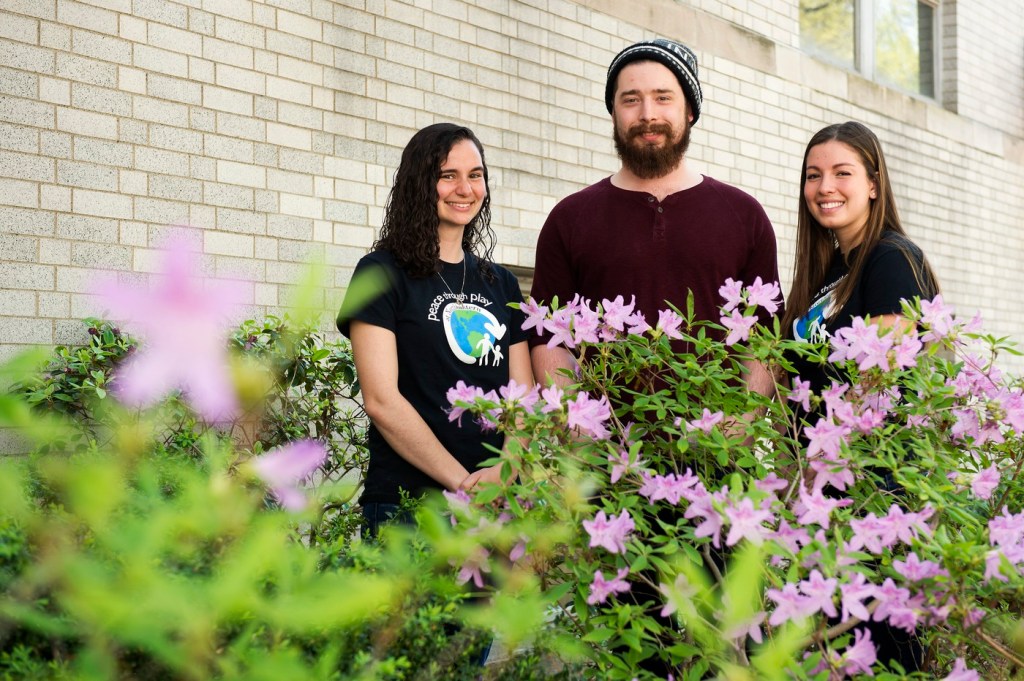Student group harnesses the power of play to foster peace

Stephanie Roberts enjoys playing games as much as the children with whom she works. But that’s not why the 21-year-old joined Peace Through Play, one of Northeastern University’s most popular student groups.
Roberts, DMSB’17, did it for the chance to effect positive change in local communities, to help create a culture of inclusion and mutual respect among children less than half her age.
“Kids love having role models like college students come to their class every single week and spend time with them,” said Roberts, who joined the student group in 2014 and is currently one of its three co-executive directors. “Play provides a forum in which they can learn how to work cooperatively and function as positive members of their communities.”
Known as PTP, the group aims to harness the power of play to foster peace in seven K-8 schools and group homes in Boston’s Roxbury, Dorchester, Mission Hill, and South End neighborhoods.
In the fall, some 140 student volunteers draw on up to 150 different games to explore themes like advocacy, conflict resolution, and self-awareness. In the spring, they challenge the children to apply these concepts to community service projects that range from planting flowers and cleaning up parks to designing trinkets for kids at Boston Children’s Hospital and making peanut butter and jelly sandwiches for Meals on Wheels.
“These projects are completely generated by the kids, who come up with activities to give back to the community,” explained co-executive director Avery Schnell, BHS’19. “It’s a great way to measure what they’ve learned from the in-class exercises.”
Administrators at the partner schools praise the program, saying that it’s improved their students’ self-confidence, boosted their passion for learning, and elevated their leadership skills. “Peace Through Play provides a positive outlet for our students to share their feelings, curiosity, and energy,” said Karen Gonzalez, the director of community partnerships and extended learning for the Hurley K-8 School in the South End. “Without the program, our students would not be as passionate and engaged as they are now.”
Noted Sarah Kilroy, the director of the after school program at the Rafael Hernandez School in Roxbury: “Peace Through Play gives students the chance to get on stage and show their skills. We have had students cry when the volunteers leave and ask to get their emails to stay in touch with them.”
One of these volunteers is co-executive director Mark Dietrich. He joined PTP in 2012 and worked with the kindergarten and first-grade students at the Hurley School this spring, teaching them teamwork, leadership, and critical thinking skills through games like the human knot.
“This was one of my favorite activities because students recognized what we were trying to accomplish,” said Dietrich, SSH’17. As the game’s facilitator, he watched as the kids’ teamwork skills improved over time until they eventually elected a leader who guided the group to success. For him, working to promote this kind of intellectual growth has been what’s made the program so rewarding. As he put it, “Sometimes kids think what we’re doing is lame, but we’re persistent and they become more and more engaged as the school year goes on.”
Both Dietrich and Roberts noted that Peace Through Play has shaped their career paths, leading them to find their true callings. Dietrich changed his major from communication studies to English, realized that he wanted to become a teacher, and then did a co-op at an elementary school in Newton, Massachusetts, to enhance his resumé. Roberts, a fourth-year business administration major, wants to work for a nonprofit, the skills for which she honed as PTP’s director of on-campus affairs.
“I realized I wasn’t making the kind of change I wanted to see and viewed Peace Through Play as a test run for becoming a teacher,” Dietrich explained. “I fell in love with it and realized that changing lives and impacting people is what I’m passionate about.”
Said Roberts: “I’m not a business major for the sake of making money. I want to work for a useful cause and help people.”





